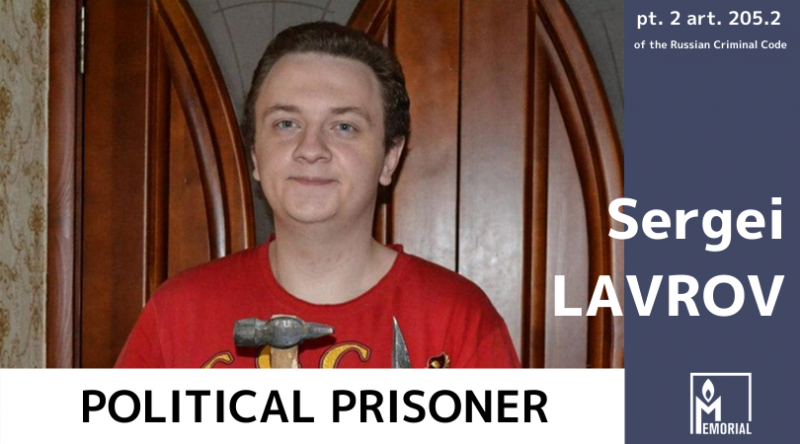Kursk resident Sergei Lavrov, convicted of justifying terrorism on VKontakte, is a political prisoner

Memorial Human Rights Centre, in line with international guidelines defining the term ‘political prisoner,’ considers 29-year-old Kursk resident Sergei Lavrov a political prisoner. Lavrov’s prosecution has had the aim of forcing him to cease his civic activism and public criticism of the authorities. He was deprived of his liberty in violation of the right to a fair trial, freedom of thought and expression and other rights and freedoms guaranteed by the International Covenant on Civil and Political Rights and the European Convention for the Protection of Human Rights and Fundamental Freedoms. There is no evidence he committed a crime. We believe the criminal charges against Lavrov should be dropped and he himself released immediately.
Who is Sergei Lavrov and what is he accused of?
The prosecution of the 29-year-old left-wing activist from Kursk, Sergei Lavrov, for criticizing the Russian authorities on the Internet began in 2015. At first, he was charged with insulting the president (the charges were dropped), then with inciting extremist activities (for which he was convicted and immediately amnestied).
In 2019, Lavrov was prosecuted on seven charges of inciting terrorism and justifying terrorist activity (Article 205.5, Part 2, of the Criminal Code) for publishing on his VKontakte page, and the groups he moderated on the site, seven posts about the need for ‘a people’s revolution in order to create a people’s state in the interests of all Russians.’ Twelve assessments by experts at the Kursk Laboratory for Forensic Examination of the Russian Ministry of Justice, conducted at the request of the investigators, concluded that all the posts contained incitement to acts of violence.
All the texts imputed to Lavrov say that a ‘people’s revolution’ and the establishment of people’s power in Russia are inevitable and necessary as a response to the policy pursued by the Russian authorities. The experts concluded that such texts, based on a broad interpretation of the notion ‘justification of terrorism,’ were oriented towards terrorism. In their opinion, the purpose of revolution is to change those in power, which in turn implies ‘destabilization of the activities of official bodies,’ which is one of the elements of the definition of terrorism.
Why do we consider Lavrov a political prisoner?
In the texts in question, Lavrov does not explain what he means by a ‘people’s revolution.’ However, having read his personal page on VKontakte (which was read by 50 to 300 regular subscribers rather than by an ‘unlimited, wide audience,’ as the court argued), we can definitively state that Lavrov spoke only of peaceful forms of protest ‘within the framework of Article 31 of the Constitution,’ that people should go to the streets peacefully and without weapons, as well as taking part in elections and running awareness-raising campaigns. In court he explained his political position in the same way.
In various countries, changing those who are in power is often the result of peaceful non-violent civic protests. Neither legally nor morally can such ’revolutions’ be equated with terrorism.
Any definition of terrorism must refer to acts of violence. Our analysis shows that none of the publications for which Lavrov has been charged constitutes a public statement advocating the ideology and practice of terrorism as something that is right and in need of support or emulation. In other words, they do not constitute justification of terrorism as defined in the criminal law. A charge brought under a ‘terrorist’ article of the Criminal Code appears plainly excessive and is disproportionate to the danger to society represented by the action in question. At the same time, the reasoning employed by the experts and the court clearly shows elements of manipulation aimed at bringing in a guilty verdict in the case.
The medical aspect of the sentence deserves particular attention. The forensic psychiatric examination found Lavrov sane, noting that he had a condition that allowed for a very wide range of manifestations. In our opinion, in recognizing Lavrov as responsible for his actions, and at the same time sending him for compulsory treatment, the court made an evidently contradictory decision. Moreover, it is difficult to imagine how, once in a penal colony, Lavrov would be able to receive qualified specialist assistance. The inability to ensure Sergei Lavrov’s right to receive qualified medical care forces us to express serious fears for his life and health.
Recognition of an individual as a political prisoner or as a victim of politically motivated prosecution does not imply Memorial Human Rights Centre agrees with, or approves of, their views, statements, or actions.
More information about this case, the content of Lavrov’s posts, the experts’ conclusions and the legal arguments involved are available on the website of Memorial Human Rights Centre.
How you can help
You can support all political prisoners by donating to the Fund to Support Political Prisoners of the Union of Solidarity with Political Prisoners via PayPal, using the e-wallet at helppoliticalprisoners@gmail.com.
Die Lage der politischen Gefangenen und andere Menschenrechtsprobleme verschärfen sich von Jahr zu Jahr. Wir beleben den Dialog zwischen der russischen und der deutschen Menschenrechtsgemeinschaft wieder und bauen ihre konstruktive Interaktion, wechselseitige Information und Unterstützung auf.
Wir stellen Informationen für die deutsche Öffentlichkeit über die Situation des Schutzes von Menschenrechten in Russland und Belarus zur Verfügung und die russische und belarussische Seiten werden entsprechend über den Stand der Dinge auf diesem Gebiet in Deutschland informiert; wir schaffen einen Mechanismus zur Unterstützung russischer und belarussischer Menschenrechtsverteidiger, Opfer politischer Repressionen und politischer Gefangenen.
Wir freuen uns auf Ihre Teilnahme am deutsch-russischen Menschenrechtsdialog auf unserer Website und in den Sozialen Netzen. Ebenso laden wir Sie ein, den Newsletter zu Menschenrechtsfragen zu abonnieren, indem Sie auf den folgenden Link klicken.